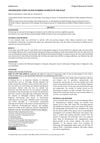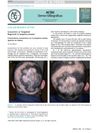 April 2023 in “Our Dermatology Online”
April 2023 in “Our Dermatology Online” Trichoscopy is effective in diagnosing trichotillomania by showing specific hair patterns.
 March 2023 in “Photodiagnosis and Photodynamic Therapy”
March 2023 in “Photodiagnosis and Photodynamic Therapy” Low vitamin D levels are linked to severe and active alopecia areata.
 January 2023 in “Asian Journal of Pediatric Research”
January 2023 in “Asian Journal of Pediatric Research” Trichoscopy is crucial for diagnosing and assessing alopecia areata in children.
 November 2022 in “Cosmetics”
November 2022 in “Cosmetics” Red pigmented rice, like Sang-Yod rice, could help promote hair growth and prevent hair loss.
 October 2022 in “International journal of dermatology and venereology”
October 2022 in “International journal of dermatology and venereology” A woman's sudden hair loss was linked to azathioprine use despite normal enzyme levels, and improved after stopping the drug and starting treatment.
 July 2022 in “المجلة العراقية للصيدلة”
July 2022 in “المجلة العراقية للصيدلة” Most women with excessive hair growth (hirsutism) also experience a common type of non-scarring hair loss called Androgenetic alopecia with telogen effluvium.
 January 2022 in “Journal of Dermatology and Dermatologic Surgery”
January 2022 in “Journal of Dermatology and Dermatologic Surgery” Trichoscopy is useful for quickly diagnosing different types of hair loss without needing biopsies.
 October 2021 in “International journal of research in dermatology”
October 2021 in “International journal of research in dermatology” No link between scalp patterns and alopecia severity in children, but more severe cases often had nail abnormalities.
Melanin-rich skin has unique challenges in diagnosing and treating skin diseases.
 January 2021 in “Indian journal of dermatopathology and diagnostic dermatology”
January 2021 in “Indian journal of dermatopathology and diagnostic dermatology” Trichoscopy is a reliable method for diagnosing hair and scalp disorders quickly and non-invasively.
January 2020 in “Indian dermatology online journal” Alopecia areata can show unusual red-dotted vessels and dithranol treatment may mask typical patterns.
 January 2018 in “Hair transplant forum international”
January 2018 in “Hair transplant forum international” Nutrafol might help reduce hair loss due to inflammation, but more evidence is needed.
 August 2017 in “Journal of evolution of medical and dental sciences”
August 2017 in “Journal of evolution of medical and dental sciences” Trichoscopy is effective for diagnosing different types of non-scarring hair loss.
 May 2017 in “InTech eBooks”
May 2017 in “InTech eBooks” Trichoscopy and trichogram are useful for diagnosing hair and scalp conditions.
 April 2016 in “Actas Dermo-Sifiliográficas”
April 2016 in “Actas Dermo-Sifiliográficas” The document concludes that a unique target-like hair regrowth pattern in alopecia areata may be more common than thought and should be properly identified.
February 2013 in “Journal of the American Academy of Dermatology” Follicular red dots can appear where alopecia areata and vitiligo overlap.

Injecting follicular cells into skin can lead to the formation of new hair follicles.

The ProScope HR is an effective, user-friendly, and affordable tool for diagnosing hair loss.
July 2022 in “Dermatologic Therapy” Minoxidil showed better improvement than methotrexate in treating localized alopecia areata.
 34 citations,
July 2011 in “Journal of the European Academy of Dermatology and Venereology”
34 citations,
July 2011 in “Journal of the European Academy of Dermatology and Venereology” The study concluded that scalp tumors show different patterns based on age, gender, and tumor thickness, and emphasized the importance of early detection and scalp examinations.
 6 citations,
January 2013 in “Experimental dermatology”
6 citations,
January 2013 in “Experimental dermatology” Bimatoprost increases hair growth in mice without breaking down into other substances.
 4 citations,
July 2022 in “Scientific reports”
4 citations,
July 2022 in “Scientific reports” Crossbreeding improves goat fiber quality, and specific genes affect hair traits and color.
 January 2007 in “Elsevier eBooks”
January 2007 in “Elsevier eBooks” The document concludes that hair transplantation for Asians should consider unique scalp and hair traits, use small grafts, and combine surgery with medication like finasteride and minoxidil for best results.
51 citations,
October 2002 in “Archives of dermatology” The document does not conclude the effectiveness of the 800-nm pulsed-diode laser for treating scalp cellulitis.
31 citations,
October 1992 in “Archives of Dermatology” The man's scalp condition did not improve with tetracycline treatment.
15 citations,
October 1999 in “International Journal of Dermatology” Sleeping on a waterbed caused a skin infection, which cleared up with clindamycin gel.
13 citations,
March 1983 in “International Journal of Dermatology” Minoxidil caused red hair to grow on a man's temples.
 1 citations,
October 2018 in “Madridge journal of dermatology & research”
1 citations,
October 2018 in “Madridge journal of dermatology & research” A young child with alopecia areata and psoriasis improved with treatment, suggesting a link between the two conditions.
 September 2022 in “JAAD Case Reports”
September 2022 in “JAAD Case Reports” COVID-19 may worsen hair loss in people with a certain type of scarring alopecia, but early treatment can help improve symptoms and hair regrowth.
6 citations,
January 2014 in “Pediatric annals” A 21-day-old baby had a skin rash that didn't improve with cream and wasn't caused by a fungus.





















